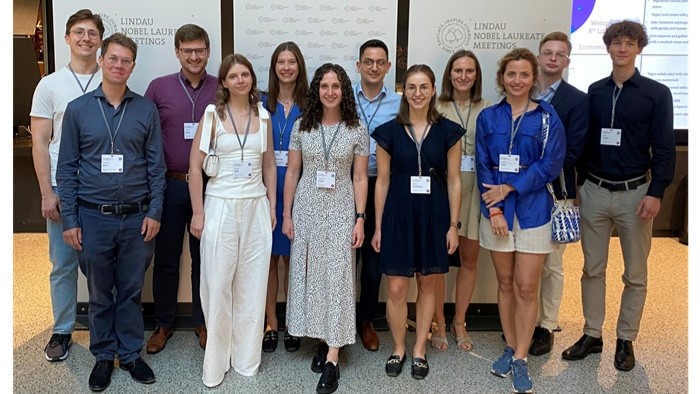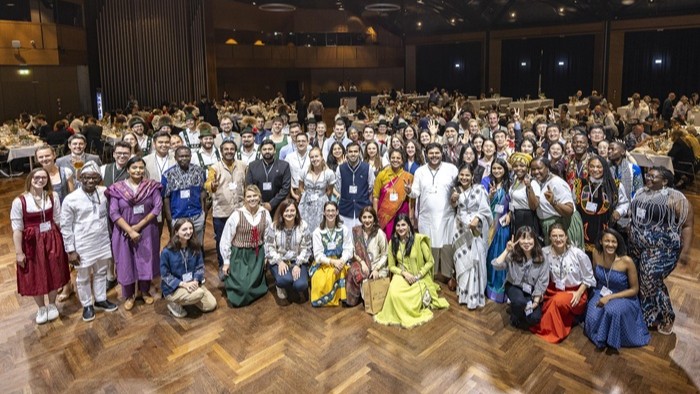Exciting conversations during the Science Walk
I had the great honor of participating in the 8th Lindau Meeting in Economic Sciences—a unique forum for scientific exchange between Nobel laureates and selected young scientists from around the world. The meeting offered not only inspiring lectures, intensive discussions, and interdisciplinary insights, but also numerous opportunities for personal encounters and in-depth exchanges.
A particular highlight was the Science Walk with Nobel Laureate in Economics Paul Romer. In a small group, we walked with him through the historic old town of Lindau and along Lake Constance – a unique opportunity to engage in scientific dialogue in an informal atmosphere. The discussion focused on current issues relating to the taxation of multinational digital corporations. Romer emphasized that platform companies with increasing economies of scale achieved structural competitive advantages through their data- and code-based business models – advantages that were insufficiently captured by traditional taxation approaches. His plea: a progressive tax on revenues from digital advertising that starts where value creation undoubtedly takes place – namely, on revenues generated, not on shiftable profits. Only in this way, he argued, could the market power of large platforms be effectively addressed and misguided incentives in digital competition be avoided.
Exchange with decision-makers from politics, business, and science
The interdisciplinary exchange with Nobel Prize winners from other disciplines was equally enriching. A joint discussion with Nobel Prize winners in physics Steven Chu and Brian Schmidt on science and innovation policy was particularly impressive. Both contributed their experience from leading positions in science and politics: Chu, former U.S. Secretary of Energy in the Obama administration, and Schmidt, President of the Australian National University. Together with Thomas Schafbauer, head of the SURF business unit at Infineon, they discussed the strategic role of technology policy and government funding. It became clear that Europe would not be able to financially outbid the innovation dynamics of large U.S. tech companies. Instead of broad-based competition, it made more sense to promote specific niches such as industrial AI applications and to set priorities there with political and economic determination. Brian Schmidt also made a remarkable point about the role of science in policy advice: it is not the best report, but the trust built up over time between researchers and decision-makers that is crucial for political impact. A clear reminder that excellent science alone is not enough—it must also be communicated in a credible way.
Another academic highlight was the lecture by Robert J. Aumann, who was honored in 2005 for his fundamental contributions to game theory. Aumann shed light on why people often act irrationally, especially in rare or unnatural decision-making situations. His central thesis: Our decisions are based on heuristics that are anchored in biological or cultural evolution. In everyday contexts, these rules of thumb usually lead to rational behavior. However, in artificially constructed or extremely unlikely scenarios—such as those that occur in behavioral economics experiments—these strategies fail because they have not been “tested” evolutionarily. The result is systematic errors that cannot be easily corrected by mere information or experience.
In addition to the scientific program, the social events also contributed to the special atmosphere of the conference. I particularly remember the Bavarian Evening, hosted by the Bavarian State Government—a festive setting for open discussions, new acquaintances, and a shared view of the role of science in society and politics.
Participating in the Lindau Meeting gave me valuable inspiration for my future research. The intensive discussions with Nobel Prize winners, experts, and committed young scientists from all over the world sharpened my view of the role of economics in the political decision-making process. The meeting was invaluable for my own scientific work, which is dedicated to making economic findings usable for reliable policy-making.
I would like to express my special thanks to the Elite Network of Bavaria, which made this extraordinary experience possible by nominating me.
Text: Peter Kreß



